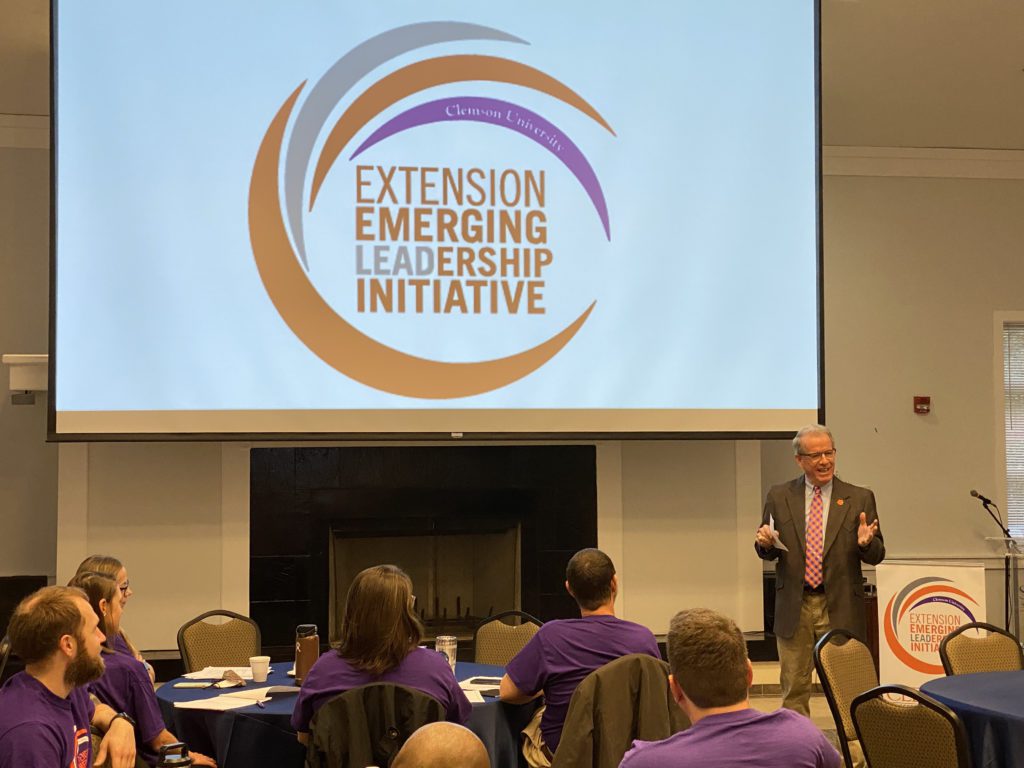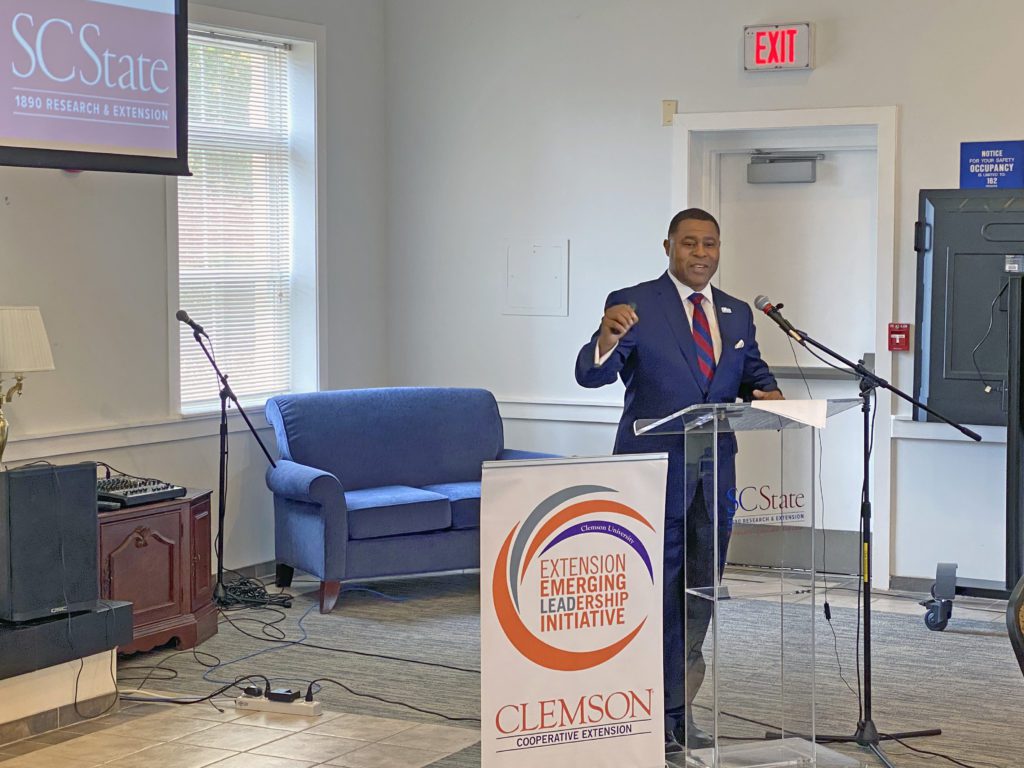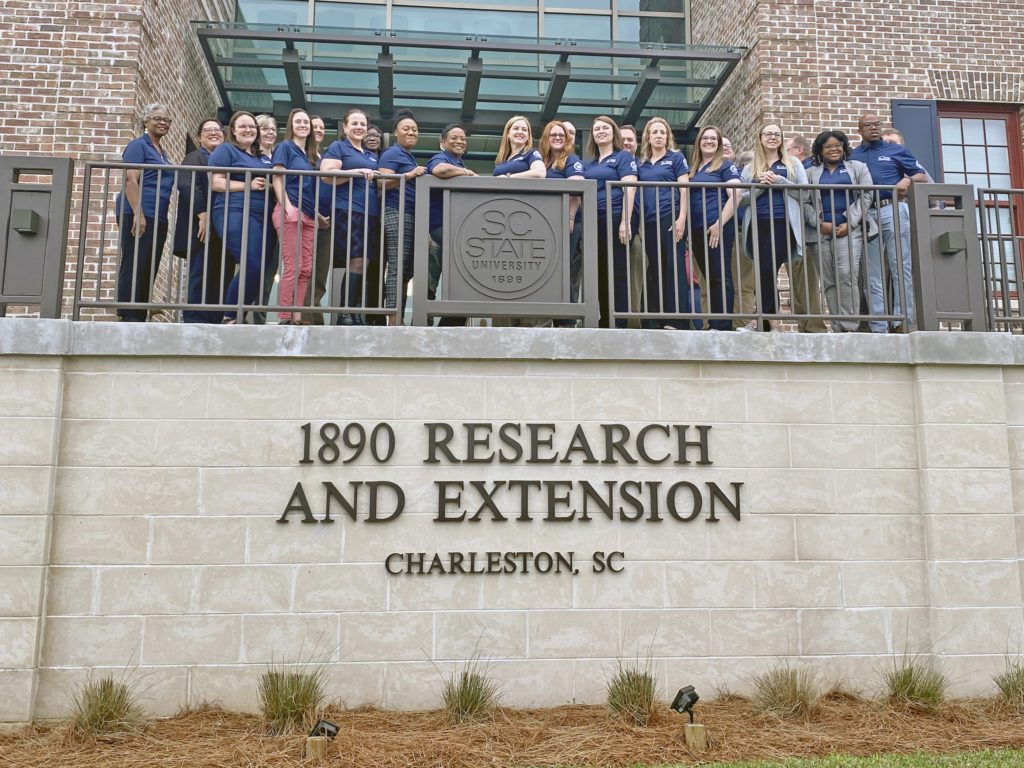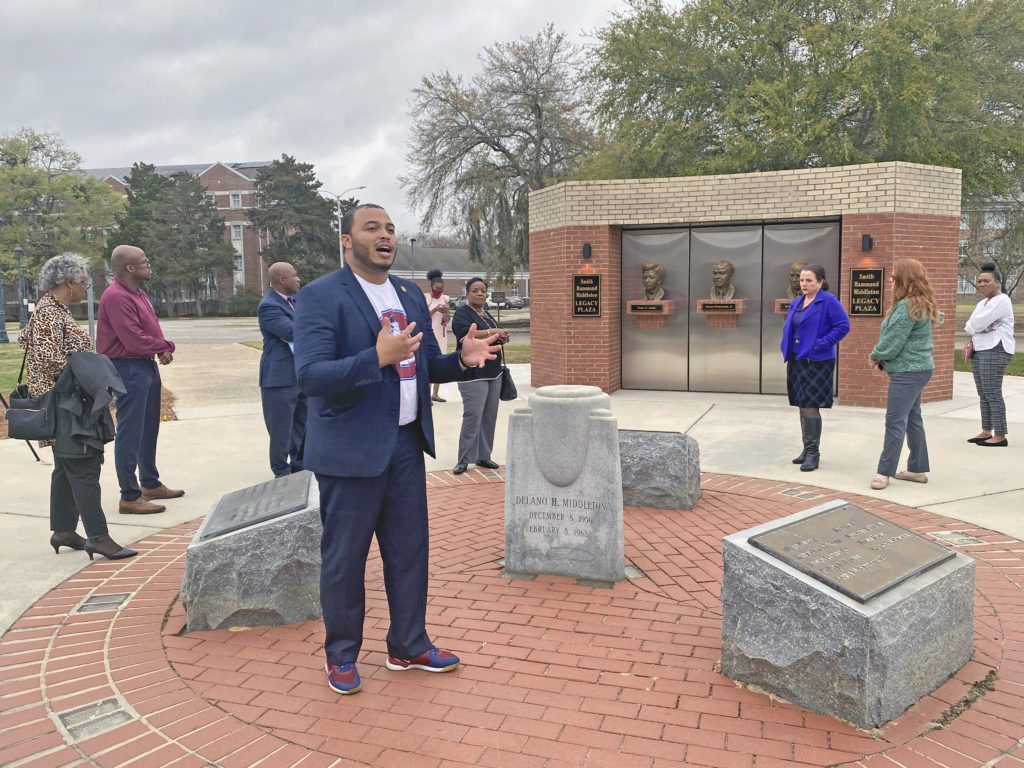Clemson University issued the following announcement on March 25.
Deon Legette is a self-proclaimed “proud and loyal daughter” of South Carolina State University, but her most recent trip to its Orangeburg campus was about strengthening a sibling bond: the one between her alma mater and Clemson, its sister land-grant university in the state.
Legette, a Clemson Cooperative Extension veteran, created the Extension Emerging Leadership Initiative (EELI) in 2018 as a development opportunity aimed at grooming the next generation of Extension leaders in South Carolina.
After a successful inaugural class, three participants from South Carolina State University’s 1890 Research & Extension Program were included in the current cohort with the goal of building more connections among the state’s Extension professionals.
Three faculty and staff were also added to the 2021-22 cohort from Clemson’s College of Agriculture, Forestry and Life Sciences (CAFLS) to strengthen connections between the college’s education and outreach missions, and Legette and the 21-member EELI class spent March 8-10 in Orangeburg for two days of training, service, motivation and team building.
“This will be a great turning point for continuous partnerships between the two land-grant universities,” said Legette, who directs field operations for Clemson Extension as well as the EELI program.
Extension serves as the outreach arm of an institution’s three-pronged land-grant mission — of education, research and outreach — helping to improve the quality of life of South Carolinians by providing unbiased, research-based information through an array of public outreach programs.
The Morrill Act of 1862 was enacted during the American Civil War and allowed for the creation of land-grant colleges such as Clemson in U.S. states, while the second Morrill Act of 1890 expanded the model to include the 1890 land-grant institutions such as SC State and other historically Black universities. Clemson Extension has offices in all 46 South Carolina counties, while S.C. State has offices in 32 counties and counting as it continues to expand its footprint.
Clemson Extension Director Tom Dobbins said that in a state and world that is divided along so many lines, it’s important for South Carolina’s two land-grant universities to make sure the needs of the people of South Carolina are being met.
 Clemson Extension Director Tom Dobbins speaks to the 2021-22 cohort of the Extension Emerging Leadership Initiative on March 10 in the Presidents’ State Room at South Carolina State University.
Clemson Extension Director Tom Dobbins speaks to the 2021-22 cohort of the Extension Emerging Leadership Initiative on March 10 in the Presidents’ State Room at South Carolina State University.
“It was always meant for us to work together as one unit to provide the land-grant mission to every citizen in South Carolina,” Dobbins said. “And because of racial tensions and different things that we heard here today — such as the (Orangeburg Massacre of 1968) — we have not been able to fulfill that mission. However, over the last several years, Vice President and Executive Director for 1890 Programs Dr. Louis Whiteside and myself have been working extremely hard to join our organizations to keep everybody’s identity the same — SC State has a very proud tradition in Extension, and so does Clemson — but we know because of budgetary constraints and everything else, together we will be more powerful to get the words of research out to our citizens in South Carolina.”
Whitesides concurred with Dobbins on the subject, saying SC State and Clemson have a history of collaboration that includes the creation of a joint advisory council, sharing offices, joint research and even developing a joint Plan of Work, a written document developed by Cooperative Extension educators to serve as a guide for programming over a set period.
“The Plan of Work was not required (in the past) to be joint. Each university was responsible for submitting its own. However, SC State and Clemson decided we’d send ours together, and we continue to submit a joint plan of work,” Whitesides said. “Our intentional efforts to collaborate further demonstrates our commitment to improve quality of life for all South Carolinians by leveraging the resources of both institutions and the expertise of staff.”
The objectives of EELI, meanwhile, are to provide opportunities for personal growth and career development, enhance leaders’ roles at a higher level of excellence, bolster cohesion and team building among leaders, promote and practice interpersonal skills, and provide tools and skills to enhance leadership.
 South Carolina State University Vice President and Executive Director of Land Grant Programs Louis Whitesides speaks to the 2021-22 cohort of the Extension Emerging Leadership Initiative.
South Carolina State University Vice President and Executive Director of Land Grant Programs Louis Whitesides speaks to the 2021-22 cohort of the Extension Emerging Leadership Initiative.
“Succession is important, leadership is important, and we have to make sure that there is a plan in place for when people retire that leadership continues to be one of the priorities not only for Extension but for everybody in the university,” Legette said.
As a service project during the March meeting of EELI, each member of the cohort was assigned to talk to a class at the Felton Charter School on SC State’s campus about what their job and career entail. The cohort also visited the new 1890 Coastal Region Research & Education Center in downtown Charleston where 1890 Extension’s Agribusiness program will be showcased.
Sydney Keith, education, innovation and support program coordinator for SC State 1890 Extension, said she wanted to be part of the EELI program because this was the first year it was a collaboration between Clemson and South Carolina State.
“That is important because it shows how both schools are serving the state of South Carolina and how we are planning to do more joint efforts in the community going forward,” she said.
Keith said the collaboration allows 1890 Extension and Clemson Extension agents to compare their programs and goals and how their methods of reaching those goals differ between the two institutions.
“We have different perspectives, we have different types of stakeholders that we interact with — so even though we have a common goal, we just might not reach that goal the same way,” Keith said. “It was great to see how other people approach different things and see their different viewpoints. Now, I have a whole cohort of team members who I can call if I’m in their region who will provide additional resources and support for me.”
 The cohort also visited the new 1890 Coastal Region Research & Education Center in downtown Charleston where 1890 Extension’s Agribusiness program will be showcased.
The cohort also visited the new 1890 Coastal Region Research & Education Center in downtown Charleston where 1890 Extension’s Agribusiness program will be showcased.
A great deal of the credit for creating that collaboration belongs to Legette, who was awarded the prestigious Martin Luther King Jr. Award for Excellence in Service in 2020 by the President’s Office and the Division of Inclusion and Equity at Clemson University.
Legette was inspired to create the program after taking part in the President’s Leadership Institute, a nine-month leadership development program started by Clemson University President James P. Clements. Upon completion, Legette approached Dobbins and Associate Director Brian Callahan about creating a similar program for Extension personnel.
“A leader has to have vision,” Legette said. “A leader has to know where the organization is, and a leader has to know what direction the organization is going in. So, a good leader is going to have the vision to tell you what is going to come and what is expected in the future.”
Dobbins said Legette has done a tremendous job of giving young Extension professionals an opportunity to shine through the program.
“I’ve seen the people who have gone through EELI, they are not going to be our next generation of leaders — they are a generation of leaders right now — and they bring a new vim and vigor to their jobs,” he said.
Renee Hall, 4-H Agent Upstate region for 1890 Extension, said the agents from SC State were grateful to be invited into the cohort and to be a part of the initiative.
 South Carolina State University Director of Admissions Davion Petty gives an historical tour of the campus to members of EELI. Smith-Hammond-Middleton Memorial Monument. The plaza and monument were erected to honor the deaths of Henry Smith and Samuel Hammond, both SC State College students, and Delano Middle, a student at Wilkinson High School, in the 1968 Orangeburg Massacre and in tribute of the students who were wounded that night.
South Carolina State University Director of Admissions Davion Petty gives an historical tour of the campus to members of EELI. Smith-Hammond-Middleton Memorial Monument. The plaza and monument were erected to honor the deaths of Henry Smith and Samuel Hammond, both SC State College students, and Delano Middle, a student at Wilkinson High School, in the 1968 Orangeburg Massacre and in tribute of the students who were wounded that night.
“Leadership is very important to me,” Hall said. “I’m fairly new to Extension being only involved for about five years, but I’ve been involved in other areas of leadership for numerous years — and this has just been a great opportunity to grow in what it means to be a leader, to learn to lead from a point of service and giving, which resonates with me because that’s who I am. So, just being a part of this has been a wonderful opportunity to continue my growth as I try to be a better leader.”
And Hall said it meant a great deal to her personally to see 1890 Extension purposefully coming together and collaborating with Clemson Cooperative Extension
“I’ve been working with teenagers and young people for over 25 years, and to come into Extension five years ago and continue to impact my community means a lot to me,” Hall said. “Since I serve in the Upstate region, I’m right there near Clemson — and for us to work together means a lot. … It’s not a competition, it’s a cooperative effort to impact the lives of the young people and their families around us. So, we see each other as collaborators and not competitors, and this cohort has allowed the opportunity for that networking to grow even more and be stronger.”
The members of the 2021-22 cohort of EELI are:
• Katie Altman Collins, Water Resources Agent — Sumter County
• Lance Beecher, Assistant Extension Specialist — CAFLS
• Ben Boyles, Agribusiness Agent — York County
• Chad Carter, Food Safety/Systems Associate — Charleston County
• Sherry Davis-Livingston, 4-H Agent — Georgetown County
• Jason Gore, FFA/4-H Program Coordinator
• Jeremy Greene, Professor of Entomology — CAFLS
• William Hardee, Agronomy Agent — Horry County
• Lauren Hood, 4-H Agent — York County
• Karen Jackson, Water Resources Agent — Richland County
• Yashia Marshall, Grants Coordinator — CAFLS
• Rhonda Matthews, Rural Health Extension Associate — Greenwood County
• Jenny Mountford, 4-H Agent — Abbeville County
• Katie Shaw, 4-H Extension Associate — Sandhill Research and Education Center
• Amber Starnes, Livestock Agent — Chesterfield
• Guinn Wallover, Water Resources — Berkeley
• Alana West, 4-H Agent, Newberry
• Kevin Burkett, Agribusiness Extension Associate — Sandhill REC
• Renee Hall, 4-H Agent Upstate region — SC State 1890 Research and Extension
• Cornelius Hamilton, Acting Regional Director – Lowcountry — SC State 1890 Research and Extension
• Sydney Keith, Education, Innovation and Support Coordinator — SC State 1890 Research and Extension
Original source can be found here.



 Alerts Sign-up
Alerts Sign-up